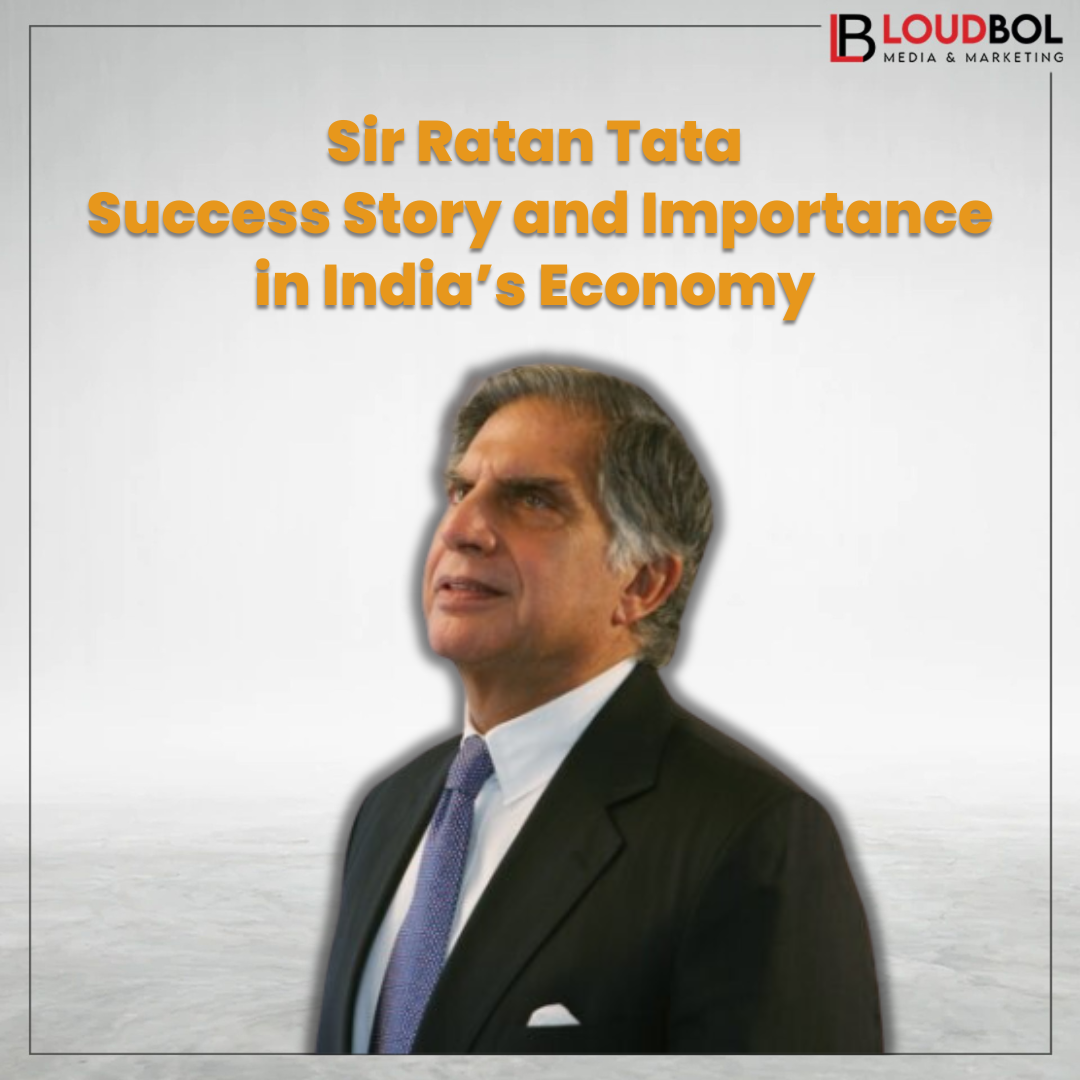Sir Ratan Tata, the patriarch of the Tata Group, is a name synonymous with visionary leadership, ethical business practices, and a commitment to national development. Through his transformative leadership, he has played a pivotal role in shaping and elevating Brand India on the global stage. His remarkable achievements, values-driven approach, and commitment to social responsibility have left an indelible mark on Indian industry, society, and the world at large.

Early Life and Leadership Journey
Ratan Tata was born in 1937 into the prominent Tata family, which had already established a legacy of industrial excellence and philanthropy in India. After studying at Cornell University and Harvard Business School, he joined the Tata Group in 1961, initially working on the shop floor at Tata Steel. Over the years, he gained extensive experience across various Tata companies.
In 1991, Ratan Tata took over the reins of the Tata Group from J.R.D. Tata. At the time, India was undergoing economic liberalization, which posed both challenges and opportunities for Indian businesses. Under Ratan Tata’s leadership, the Tata Group embraced globalization, transforming itself into a conglomerate with a significant international presence.
Global Expansion and Strategic Acquisitions
Ratan Tata’s ambition to transform Tata Group into a global powerhouse saw the company entering new markets, acquiring global brands, and setting new benchmarks for Indian companies. His expansionary vision extended to multiple industries, including steel, automotive, beverages, hotels, and telecommunications. These strategic moves reshaped not only Tata but also India’s standing in the global economy.
Tata’s Marketing Strategy: A Tale of Trust and Innovation
Tata Group, a multinational conglomerate based in India, has consistently demonstrated a remarkable ability to connect with consumers across various sectors. Their marketing strategies, underpinned by a strong emphasis on trust, innovation, and social responsibility, have been instrumental in their enduring success.
Key Elements of Tata’s Marketing Strategy:
Building Trust:

Heritage and Reputation: Tata’s long history and reputation as a responsible corporate citizen have instilled a sense of trust among consumers.
Transparency and Ethics: The company’s commitment to ethical business practices and transparent operations has further strengthened its credibility.
Innovation and Product Differentiation:
Cutting-Edge Products: Tata has consistently introduced innovative products that cater to evolving consumer needs and preferences.
Technological Advancements: The group’s focus on research and development has enabled them to stay ahead of the curve in terms of technology and product features.
Social Responsibility:
Corporate Citizenship: Tata’s philanthropic endeavors and commitment to sustainable practices have fostered a positive brand image and strengthened its connection with the community.
Cause Marketing: The group has effectively leveraged cause marketing initiatives to align its brand with socially relevant issues.
Targeted Marketing and Segmentation:
Understanding Consumer Needs: Tata has a deep understanding of its target audience and tailors its marketing efforts accordingly.
Segmentation: The group effectively segments its market to cater to diverse consumer segments with different needs and preferences.
Leveraging Technology:
Digital Marketing: Tata has embraced digital marketing to reach a wider audience and engage with consumers through social media, content marketing, and e-commerce.
Data Analytics: The group utilizes data analytics to gain valuable insights into consumer behavior and optimize its marketing campaigns.
1. Jaguar Land Rover (2008)
One of the most iconic acquisitions under Ratan Tata’s leadership was the purchase of Jaguar Land Rover (JLR) from Ford in 2008 for $2.3 billion. This acquisition marked a turning point for Tata Motors, elevating the company from a local commercial and passenger vehicle manufacturer to a global player in the luxury automobile segment. Despite initial skepticism regarding the deal’s viability—given JLR’s financial troubles at the time—Ratan Tata’s belief in the brands’ long-term potential paid off.

Impact: Today, Jaguar Land Rover contributes significantly to Tata Motors’ revenue and profits, having undergone a remarkable turnaround. The acquisition positioned Tata Motors as a formidable competitor in the global automotive industry and became a symbol of India’s ascent in the global corporate arena.
2. Corus Steel (2007)
Ratan Tata made international headlines with the $12 billion acquisition of Corus Steel in 2007. At the time, it was the largest acquisition by an Indian company, catapulting Tata Steel into the top ranks of global steel producers. Corus, a British-Dutch steel company, gave Tata Steel access to high-value European markets and cutting-edge technology, transforming Tata Steel from a regional player into one of the world’s largest steelmakers.
Impact: The Corus deal showcased Ratan Tata’s ambition to make Tata Group a global leader in diverse industries. It was a strategic move that helped Tata Steel gain a foothold in Europe and grow its international presence, even as it enhanced India’s influence in the global steel industry.
3. Tetley Tea (2000)
In 2000, Tata Tea (now Tata Consumer Products) made its first major international acquisition by purchasing Tetley Tea, one of the oldest and largest tea brands in the world, for $450 million. This acquisition marked a historic moment, as it was the first time an Indian company took over a major British brand, symbolizing India’s changing economic stature and business clout.

Impact: The Tetley acquisition positioned Tata as the second-largest tea company in the world. It expanded Tata’s global presence, particularly in Europe and North America, and signaled the company’s ability to compete globally in the fast-moving consumer goods (FMCG) sector. It also paved the way for further acquisitions and global expansion in the beverage industry.
4. Brunner Mond (2006)
In 2006, Tata Chemicals acquired UK-based Brunner Mond, a leading soda ash manufacturer, for approximately $1.1 billion. This acquisition was part of Tata Chemicals’ strategy to become a global leader in the chemical industry, specifically in the production of soda ash, a key ingredient in glass, detergents, and various other products.
Impact: The acquisition of Brunner Mond helped Tata Chemicals establish a global supply chain and solidified its leadership in the soda ash industry. This acquisition, combined with the company’s other global operations, enabled Tata Chemicals to become the world’s second-largest producer of soda ash.
5. The Ritz-Carlton Boston (2006)
The Tata Group, through its hospitality arm, Indian Hotels Company Limited (IHCL), extended its luxury hotel chain Taj Hotels into the United States with the acquisition of The Ritz-Carlton Boston in 2006 for $170 million. This was a strategic move aimed at bringing the Indian luxury hospitality experience to global markets.

Impact: This acquisition was significant in expanding Tata’s hospitality portfolio internationally. It also reinforced the Tata brand’s presence in the luxury space and contributed to making the Taj brand recognized globally.
6. Taj Group Acquisitions
Ratan Tata also orchestrated the expansion of the Tata Group’s hospitality division, the Taj Group, by acquiring iconic properties around the world. This included purchasing The Pierre in New York in 2005, and Campton Place in San Francisco, along with other strategic assets in London, Maldives, and Sri Lanka.
Impact: These acquisitions allowed the Taj Group to grow beyond its traditional markets and become a global luxury hotel brand, strengthening India’s presence in the international hospitality industry.
7. VSNL’s Global Expansion (Tata Communications)
Under Ratan Tata’s leadership, the Tata Group’s telecom arm, Videsh Sanchar Nigam Limited (VSNL), now Tata Communications, expanded aggressively into the global market. In 2004, VSNL acquired the Tyco Global Network, a leading undersea cable company, giving Tata Communications one of the largest submarine cable networks in the world.
Impact: This acquisition established Tata Communications as a global leader in the communications infrastructure space. It transformed the company into a key player in global data transfer and connectivity, positioning Tata Communications to play a vital role in the digital age.
8. Daewoo Commercial Vehicles (2004)
In 2004, Tata Motors acquired Daewoo Commercial Vehicles, South Korea’s second-largest truck maker, for $102 million. This was a strategic move to enter the global heavy commercial vehicle market, expanding Tata Motors’ product portfolio and global reach.
Impact: The acquisition allowed Tata Motors to access new markets in Asia and grow its presence in the commercial vehicle sector. It also demonstrated Tata Motors’ ability to compete in the global automotive industry, beyond passenger cars.
9. NatSteel (2005)
In 2005, Tata Steel acquired NatSteel, a Singapore-based steelmaker, for $486 million. This acquisition provided Tata Steel with a strong presence in the growing Southeast Asian markets and gave it access to steel-producing facilities across the region.

Impact: The NatSteel acquisition was a key part of Tata Steel’s strategy to expand its operations in Asia and diversify its geographic footprint. It bolstered Tata Steel’s ability to serve the fast-growing construction and infrastructure industries in Southeast Asia.
Innovation and Ethical Business Practices
One of Ratan Tata’s enduring legacies is his commitment to innovation and ethical business practices. He encouraged innovation across all Tata companies, resulting in the creation of pioneering products like the Tata Nano, the world’s most affordable car, which aimed to make car ownership accessible to millions of Indians.
Ratan Tata’s leadership has always been grounded in integrity and values. He has consistently prioritized ethical business practices and corporate governance, which has earned the Tata Group a reputation for trustworthiness. Unlike many other global conglomerates, the Tata Group is renowned for balancing profitability with social responsibility.
Philanthropy and Social Responsibility
Philanthropy has always been at the core of the Tata Group’s identity, a tradition that Ratan Tata carried forward with great dedication. The Tata Trusts, which own a substantial portion of Tata Sons (the holding company of the Tata Group), focus on various social causes including education, healthcare, rural development, and poverty alleviation.
Under Ratan Tata’s leadership, the Tata Trusts expanded their philanthropic initiatives to address pressing social issues in India. For example, the Tata Group has been a major player in developing educational institutions such as the Indian Institute of Science (IISc) and Tata Institute of Fundamental Research (TIFR). Moreover, the group has significantly contributed to disaster relief efforts and health initiatives, including the Tata Memorial Hospital for cancer treatment.
Reshaping Brand India
Ratan Tata’s legacy goes beyond the corporate world. He played a critical role in shaping the global perception of India as a land of business opportunity, innovation, and ethical leadership. His global acquisitions and partnerships, combined with his emphasis on values and social responsibility, helped transform the image of Indian businesses from merely low-cost providers to serious contenders on the global stage.
Through his leadership, Tata became synonymous with trust and quality, not just in India but worldwide. His efforts have inspired a new generation of Indian entrepreneurs and business leaders to think globally and act responsibly.
Post-Retirement Impact
Although Ratan Tata retired as chairman of Tata Sons in 2012, his influence continues to be felt both within the Tata Group and in broader business circles. He has remained actively involved in philanthropy, mentorship, and investing in innovative start-ups. His investments in start-ups like Paytm and Ola have demonstrated his forward-thinking approach and support for the Indian start-up ecosystem.

Conclusion
Sir Ratan Tata’s visionary leadership has had an immeasurable impact on India’s economy, business landscape, and global standing. He transformed the Tata Group from an India-centric conglomerate into a global powerhouse, while maintaining its commitment to ethics, philanthropy, and nation-building. Through his relentless pursuit of excellence and innovation, Ratan Tata not only transformed the Tata Group but also helped reshape Brand India for generations to come.




Average Rating